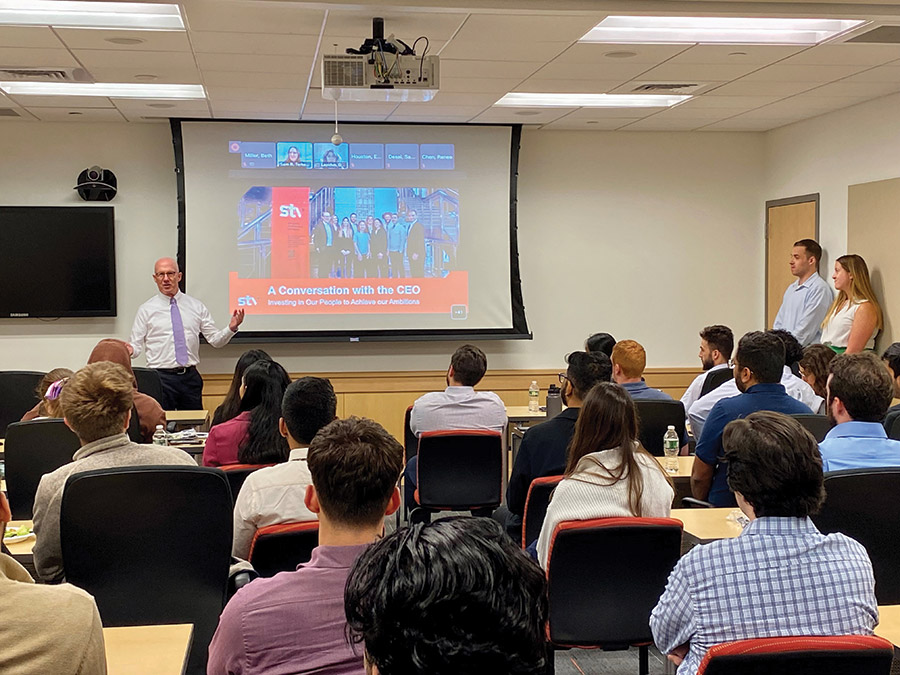As construction projects grow in size, complexity and risk—and industry talent tightens—employers want staff with broad skills and real world understanding who can handle challenges beyond the technical prowess gained from a degree.
Technology adjustments during the COVID-19 pandemic added many innovations to the industry workplace, but also forced changes in delivery of needed skill-building programs in such areas as communication, decision-making, team dynamics, networking, project management and leadership that have not been universally beneficial, particularly for early-stage employees.
“The pandemic, and resulting further dependence on remote learning, has had an isolating effect on students—limiting their ability in some cases to ask questions, communicate effectively verbally and write critically, creatively and innovatively,” says Frank E. Falcone, director of professional development and experiential education at Villanova University’s College of Engineering. “Societal … dependence on handheld electronic devices has almost fully replaced the need for basic verbal communication among many students.”
“Can you communicate your ideas to a project client or stakeholder? That’s incredibly important to the skill level I’m looking for.”
Joe Cazares, Program Management Director, Jacobs
The skills gap comes as “understanding the big picture” is more critical in project leadership, says Jamey Barbas, a veteran transportation project executive and New York region agency board member. “I tell students in my planning course they have to figure out how to get a project approved, funded and structured for delivery. That’s what matters.”
Joe Cazares, program management director at Jacobs, added that communication skills are key. “Can you communicate your ideas to a project client or stakeholder?” he asks. “That’s incredibly important to the skill level I’m looking for.”
Professional skills development has become a larger focus in many college and industry new-hire training efforts. But proponents point to repeated use—particularly by media and even human resources professionals—of the label “soft skills” for such non-technical workplace strengths in giving them a negative connotation.
“The term implies some sort of secondary or non-essential level of value,” says Pat Natale, a former industry executive who now leads the United Engineering Foundation, a practice and education support group. That “subliminally downplays” to students, faculty and future employers the importance of honing those skills, he contends—despite professional development in some form required for engineering programs to gain national accreditation and outlined as key to practice and employment in the American Society of Civil Engineers’ Body of Knowledge guidelines released in 2008.
Workforce strategist Erica Keswin said in a recent Harvard Business Review analysis that such skillbuilding was noted by LinkedIn "as the number-one way to improve company culture," adding that employees who get professional development opportunities are 15% more engaged and have 34% higher retention than those who don’t. She also pointed to key employer benefits, citing research from consultant Deloitte that organizations with a strong learning culture are 92% more likely to develop novel products and processes, 52% are more productive and 17% more profitable than peers.
But COVID-19 impacts since 2020 have upended the process for many students and new hires in gaining core skills for their career transition. “The art of having a casual conversation really took a hit,” says Andrea Welker, engineering school dean at the College of New Jersey. “Students need more intrusive advising than they did in the past to keep them on track.”

“The pandemic reminded us there is no substitute for human interaction” in the construction sector, says STV CEO Greg Kelly, here at recent annual meeting with interns and young professionals. “In this business, that doesn’t happen on a computer.”
Photo courtesy of STV
Navigating Challenges
Jared Kaplan had a systems engineer job lined up after gaining a mechanical engineering degree in 2021 from the University of Maryland, College Park. After a semester abroad in Australia was abruptly curtailed, he then faced “navigating the challenges of starting at a new company and work environment while being completely virtual,” Kaplan says. “The lack of in-person interaction makes it more difficult to network … as the only interaction available at times was over video chat. … and a lot of people do not turn their cameras on so you could interact with someone for months without seeing a face. As a new hire, it can be difficult to feel you are part of the team and to learn new things.”
But as they move past the learning curve, virtual platforms also are seen as remedies in a more time-challenged work and skill delivery environment, according to Jeffrey Russell, a continuing studies manager and engineering professor at the University of Wisconsin, Madison. He says the once automatic option “to send someone away … for a week-long short course is over,” and that students and others “embrace the choice and flexibility … as they balance competing demands on their time.”
Even so, Denise Gettman, a partner at industry consultant FMI and leadership development specialist, notes some learning trade-offs.
“Skills we have seen to be suffering most in younger employees include setting direction, thinking strategically and effective decision-making—individually and in a team environment—as well as communication across the board, managing conflict and change initiatives, giving and receiving actionable feedback and holding others accountable,” she explains.
In use of platforms such as Zoom and Microsoft Teams, Russell asks “are we really communicating, leading and managing better? I wonder about the amount of multitasking and whether team members are fully present.”
Ted Lower, a former design firm CEO and current sector HR consultant, notes an employer push for better employee understanding of macro trends such as environmental, social and governance (ESG), as it becomes a billable service offering for more companies. But he sees not much similar "versus historic norms" in other key non-technical skill areas. “The good news is that these programs exist,” says Lower. “The bad news is that even with three or four years of continuous high growth and record profit, there is no evidence of needed emphasis.”
According to one industry source, AEC firms owned significantly by private equity “all but starve such developmental steps, with discretionary budgets essentially non-existent.” But leaders of those firms would deny that contention, he said.
Feniosky Peña-Mora, a Columbia University engineering educator and ASCE president-elect, admits that loss of “the spontaneity of office learning” has particularly affected “intuitive grasp of leadership nuances,” but he says the remote environment also boosts “global networking, introducing young professionals to a variety of perspectives.”
To fill the “mentorship void,” he says employers are implementing structured digital mentoring programs and platforms for virtual shadowing. Engaging with international professionals and mentors is a draw for new industry entrants, and employers see potential in hires with a global outlook, says Peña-Mora.
Villanova University Career Compass:
Core Skills Focus by Academic Year
| Year in Curriculum | Primary Topics |
| Freshman | Engineering Careers |
| Ethical Behavior | |
| Learning Styles | |
| Team/Group Dynamics | |
| Resume Preparation | |
| Career Goals | |
| Time Management | |
| Technical Writing | |
| Presentation Skills | |
| Sophomore | Technological Advancement and Society |
| Leadership Skills | |
| Management of Self and Others | |
| Effective Listening Skills | |
| Effective Team and Group Dynamics | |
| Interviewing Skills | |
| Proactive Career Searching | |
| Junior | Inclusive Career Paths |
| Self-Awareness | |
| Conflict Resolution | |
| Resume Updates | |
| Advanced Presentation and Speaking Skills | |
| Senior | Financial Planning |
| Advanced Leadership and Management Skills | |
| The Business of Engineering | |
| Ethical Behavior in the Workplace | |
| Quality – What Is It? |
Chart: Villanova University Career Compass
Mandatory Guidance
Villanova’s Career Compass professional development program, mandatory for undergraduates, provides specific guidance in such areas as ethical behavior, personal and professional etiquette, group dynamics, networking, oral and written communication and career path planning, says Falcone. It “is not a job placement program,” he says. “It is designed to instill professionalism as the basis for long-term career success.”
Career Compass is a series of six required courses to be completed during the first three undergraduate years and one senior-level elective, open to graduate engineering students (see chart abovr).
Content is delivered using online videos, in-person events and workshops, and a guided mentors program, with students earning three credits in completing the first three years, says Falcone. The Accreditation Board for Engineering and Technology in 2021 cited Career Compass for innovation, he says. It also earned an $87,000 grant from the United Engineering Foundation to share best management practices with other schools, adds Natale.
The Next Generation
STV sees technology as creating and enabling “new ways of learning and preparing the next generation for the job,” with employees preferring “concise communication delivered digitally, says CEO Greg Kelly, The design and construction services firm has “doubled down on remote delivery,” he adds, completing more than 3,000 hours of training for 2023 summer interns.
But the pandemic also “reminded us there is no substitute for human interaction in our business,” Kelly says. “This next generation wants to learn and grow their careers fast … but in this business that doesn’t happen on a computer. It happens when you are learning and collaborating with teammates.”
He says company training involves “taking a foundation of digital skills and developing programs that build robust people skills,” emphasizing that “consequences of miscommunication in our space could be profound.”
Chris Millette, director of contractor Suffolk’s Career Starts, a two-year rotational program for recent construction management graduates involving a cohort of 100-plus members in 10 offices, says “it’s easy to focus on negative effects of the pandemic, but one benefit is complete acceptance [of virtual learning].”
Groups meet on Zoom to cover topics, “and no one thinks twice about the virtual aspect,” he says. Non-technical topics include self-awareness, building trust and handling conflict, he says, adding that an in-person public-speaking session “is one of the most anticipated and successful,” allowing participants to connect with presenters in leadership.
“The pandemic [has] led to cancelled or reduced internships, which has limited exposure of Black and minority students to the industry.”
Deryl McKissack, CEO, McKissack & McKissack
As Primus Builders “trains people up” to replace retirees, the “current concern is a graduate’s ability to seamlessly integrate into the workforce, particularly when it comes to practical skills.” says Jessica Jones, human resources director. She says Gen-Z employees “expect continuous learning opportunities and development programs” to help navigate career growth complexities.
But there is concern that professional development focused on digital delivery has set back industry diversity efforts.
“Graduates who missed out on practical, on-site experiences during the pandemic may face challenges when transitioning to field work, with the transition to remote learning inevitably reducing teamwork opportunities, adversely affecting their ability to cultivate practical skills,” says Deryl McKissack, president and CEO of McKissack & McKissack, a Washington, D.C., design and construction services firm, and president and board chair of AEC Unites, a new group set to boost opportunities for Black professionals and business owners in the construction sector.
She says such disparities affect “core competencies” in design, analysis and project management and in non-technical skills “developed through in-person interaction … that is impacting the competitiveness of many Black and minority graduates.”
With industry employers already eyeing the pending “talent cliff” due to retirements, FMI has developed a leadership development approach that challenges employee teams to use skills developed to create solutions for “a real-world organizational challenge,” says Gettman.
The program develops core skills to design and execute that effort; but also provides employees needed exposure to the employer operations and decision-making. Gettman says it gives employees “a sense of belongingness that only comes from having deep relationships, shared experiences and the opportunity to engage in work that feels meaningful.”
—With input from Emell Adolphus











Post a comment to this article
Report Abusive Comment